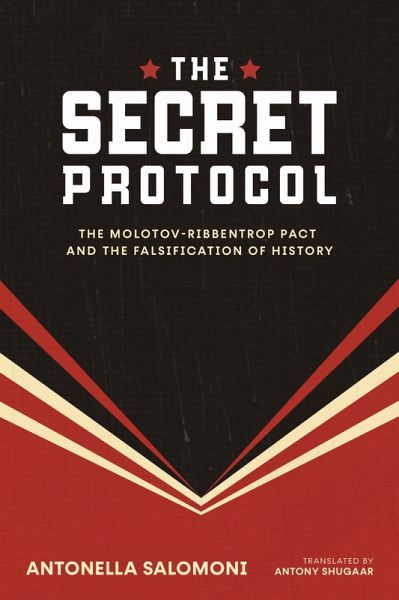
The Secret Protocol
The Molotov-Ribbentrop Pact and the Falsification of History
Übersetzer: Shugaar, Antony
Versandkostenfrei!
Erscheint vorauss. 6. Januar 2026
72,99 €
inkl. MwSt.

PAYBACK Punkte
36 °P sammeln!
In 1939, the Soviet Union and Germany agreed to a nonaggression treaty known by the names of its signatories, foreign ministers Vyacheslav Molotov and Joachim von Ribbentrop. Kept hidden from the public was an addendum to the Molotov-Ribbentrop Pact, a "secret protocol" whose existence was officially denied by the Soviet Union until 1992. It defined new borders for German and Soviet spheres of influence, effectively preparing for the partition of Poland, the Baltic states, and Bessarabia. Shortly afterward, both the USSR and Nazi Germany invaded Poland. In this volume, Antonella Salomoni scrut...
In 1939, the Soviet Union and Germany agreed to a nonaggression treaty known by the names of its signatories, foreign ministers Vyacheslav Molotov and Joachim von Ribbentrop. Kept hidden from the public was an addendum to the Molotov-Ribbentrop Pact, a "secret protocol" whose existence was officially denied by the Soviet Union until 1992. It defined new borders for German and Soviet spheres of influence, effectively preparing for the partition of Poland, the Baltic states, and Bessarabia. Shortly afterward, both the USSR and Nazi Germany invaded Poland. In this volume, Antonella Salomoni scrutinizes this consequential document and its many afterlives, focusing less on its well-studied history and more on the discourse that surrounded it. From the moment of the secret protocol's inception--and the near-instantaneous rumors of its existence--it generated friction and competing narratives. The document became public during the Nuremberg trials, but the USSR declared it a fabrication evidencing the West's willingness to falsify history during the Cold War. It continues to be relevant to the reconfiguration of history being organized by Vladimir Putin. By centering the rumors, accusations, and propaganda that the pact precipitated, Salomoni illuminates how political actors can use and abuse history, how they create and disseminate truths and falsehoods, and how they can blur the boundary between truths and falsehoods even in the glaring face of black-and-white documentation.












